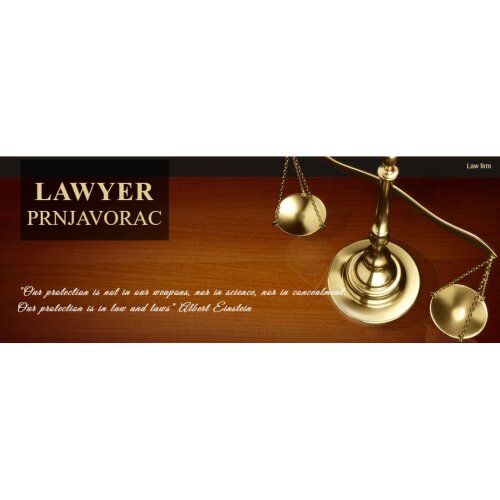
Best Constitutional Law Lawyers in Tuzla
Share your needs with us, get contacted by law firms.
Free. Takes 2 min.
List of the best lawyers in Tuzla, Bosnia and Herzegovina

About Constitutional Law in Tuzla, Bosnia and Herzegovina
Constitutional Law in Tuzla, and broadly within Bosnia and Herzegovina, focuses on the application and interpretation of the country's Constitution. The Constitution of Bosnia and Herzegovina is unique, having been established under the Dayton Agreement in 1995, which ended the Bosnian War. This Constitution is integral in outlining the division of government powers, protecting individual rights, and establishing relationships between various governmental entities. As a part of the Federation of Bosnia and Herzegovina, Tuzla must adhere to both federal and regional constitutional provisions.
Why You May Need a Lawyer
Engaging with Constitutional Law often involves complex scenarios where a lawyer's expertise can be invaluable. You may need a lawyer if you are involved in issues relating to the violation of constitutional rights, challenges to the legality of laws, jurisdictional conflicts between entities, or in matters of personal freedoms and discrimination. Lawyers specializing in Constitutional Law can help navigate these legal processes, represent you in court, and offer expert advice tailored to your situation.
Local Laws Overview
The legal landscape in Tuzla is shaped by both the Federation of Bosnia and Herzegovina's legal framework and local municipal regulations. Key constitutional aspects include the protection of human rights, the balance of powers between the executive, legislative, and judicial branches, and property rights. Understanding these laws aids in recognizing potential constitutional disputes and the channels available for resolving them.
Frequently Asked Questions
What constitutes a violation of constitutional rights?
Any action or law that infringes upon the freedoms and rights guaranteed by the Constitution, such as freedom of speech, religion, and the right to a fair trial, can be considered a violation.
How does the court system work for constitutional matters?
Constitutional issues can be reviewed by both the Constitutional Court of Bosnia and Herzegovina and the Supreme Court of the Federation. These courts have jurisdiction over matters of constitutional interpretation and significant legal questions.
Can local laws override the federal Constitution?
No, local laws cannot override the federal Constitution. Any conflict between local laws and the Constitution must be resolved in favor of the constitutional provisions.
How can I challenge a law as unconstitutional?
You would generally need to file a case in the Constitutional Court, presenting arguments and evidence that demonstrate the law's discordance with constitutional principles.
What are my rights during a constitutional dispute?
Your rights include legal representation, a fair trial, and the ability to appeal decisions to higher courts if necessary.
Are there any legal aid services available for constitutional issues?
Yes, there are legal aid services available through government and non-profit organizations designed to assist individuals who cannot afford legal representation.
What role does the Human Rights Ombudsman play?
The Human Rights Ombudsman of Bosnia and Herzegovina provides a platform for addressing grievances related to human rights violations and acts as a mediator in disputes.
How are property rights protected under the Constitution?
Property rights are safeguarded against arbitrary state interference, and any expropriation must be for public benefit with adequate compensation.
What steps should I take if I believe my rights are being violated?
You should document the violation, seek legal advice, and consider filing a complaint with relevant judicial or ombudsman institutions.
Who can provide expert testimony in constitutional cases?
Experts may include law professors, experienced constitutional lawyers, and human rights advocates who can provide insights and analyses pertinent to the case.
Additional Resources
For additional support, consider reaching out to the Constitutional Court of Bosnia and Herzegovina, the Human Rights Ombudsman, and the local Bar Association for referrals and guidance. Non-governmental organizations like the Helsinki Committee for Human Rights can also provide assistance and resources.
Next Steps
If you need legal assistance in constitutional matters, start by consulting with a reputable lawyer specializing in Constitutional Law. Gather any relevant documents and evidence pertaining to your case. Consider attending a legal clinic or workshop to better understand your rights and the process. Engage with local legal aid services if affordability is a concern. Ultimately, taking proactive steps and seeking professional guidance will be key in effectively handling your constitutional law issues in Tuzla.
Disclaimer:
The information provided on this page is for general informational purposes only and does not constitute legal advice. While we strive to ensure the accuracy and relevance of the content, legal information may change over time, and interpretations of the law can vary. You should always consult with a qualified legal professional for advice specific to your situation. We disclaim all liability for actions taken or not taken based on the content of this page. If you believe any information is incorrect or outdated, please contact us, and we will review and update it where appropriate.









